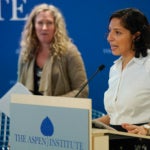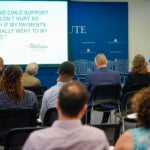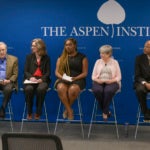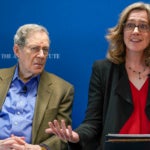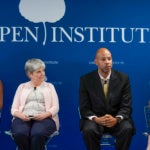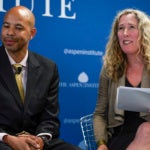The Payback Problem: Why Child Support Does Not Go Where It’s Needed Most
As we’ve learned in our EPIC Consumer Debt work, fines and fees can deplete the financial security of millions of Americans. This upcoming event highlights the consequential, yet lesser known, issue of requiring low-income parents to pay back public assistance through their child support payments.
When millions of low-income parents make child support payments, the majority of their payments do not go to their children. Instead, most of their payments go to reimburse the government for the cost of public assistance for the mother and child. In California, 70% of outstanding child support debt is owed to the government, not children. The majority of public assistance payback debt in California is owed by parents earning under $10,000. California also charges 10% interest on public assistance payback debt. Requiring parents to pay back public assistance takes money from low-income children, sets low-income parents up to fail, and saddles families with growing debt that they cannot pay.
In California, advocates across the state have come together to call for reforms. States like Colorado and New Jersey have enacted reforms that other states can learn from. Join Aspen FSP on April 24th for a conversation about the payback problem and solutions advancing in California and throughout the nation.
The event will feature a panel discussion moderated by Anne Stuhldreher, Director of the San Francisco Financial Justice Project and Aspen Financial Security Program Senior Fellow. Anne is a coauthor of The Payback Problem: How Taking Parents’ Child Support Payments to Pay Back the Cost of Public Assistance Harms California Low-Income Children & Families and recently authored an op-ed about The Payback Problem in The Los Angeles Times. Reception to begin at 5:00 pm.
Please contact Dyvonne Body at Dyvonne.Body@aspeninstitute.com if you have any questions.
Featured Panelists:
- Larry Desbien, Director, The Colorado Division of Child Support Services
- Peter Edelman, Professor, Georgetown University Law Center (Bio)
- Heather Hahn, Senior Fellow, Urban Institute (Bio)
- Nikki Thompson, Senior Policy Associate, Job Opportunities Task Force of Maryland (Bio)
- Tony Vinson, Recruitment and Intake Specialist, DC Central Kitchen
- Vicki Turetsky, Former Commissioner of the Office of Child Support Enforcement, U.S. Department of Health and Human Services
- Anne Stuhldreher (Moderator), Senior Fellow, The Aspen Institute Financial Security Program (Bio)
EVENT RECAP:
When low-income residents make a child support payment most of it goes to pay back the government for the cost of public assistance. Only the first $50 goes directly to the family. @FairFinesFees @AnneStuhldreher #AspenEPIC pic.twitter.com/zXY6cdkaNS
— Aspen FSP (@AspenFSP) April 24, 2019
California charges 10% interest on payments – A parent with $36,000 in payback debt could pay $50 every 2 weeks and at the end of 30 years would owe $400,000. #AspenEPIC @FairFinesFees @AnneStuhldreher pic.twitter.com/HSq7cXcS6L
— Aspen FSP (@AspenFSP) April 24, 2019
At a great @AspenFSP event on child support payments with @AnneStuhldreher @NTesq and @peterbedelman, w/ others. Very eye-opening account of how child support payments often go to reimburse the government for the cost of public assistance — not to families and children pic.twitter.com/G3KGyj7oc5
— Sebastian Johnson (@sdpjohnson) April 24, 2019
JOTF’s very own @NTesq discussing the impact child support debt has on working families and low wage workers with the @AspenInstitute’s panel, “The Pay Back Problem.” pic.twitter.com/1eoXR5WKaw
— Yanet (@TheeAdvocate_) April 24, 2019
